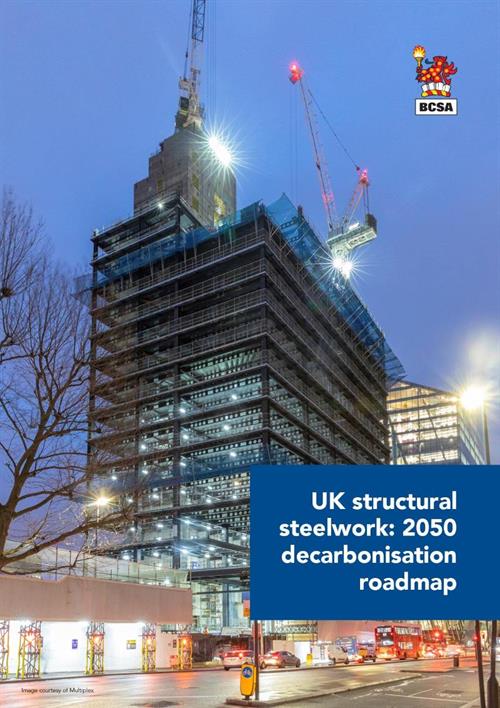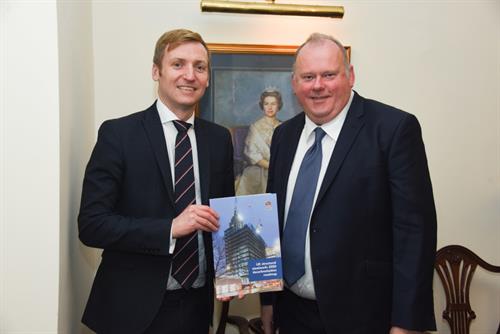
BCSA News and Insights
President's Column November/December 2021
16/11/2021
Category: President's Column
In October, British Steel announced their 'Low-Carbon Roadmap' demonstrating its commitment to long-term sustainable steelmaking and the delivery of net-zero steel by 2050. It's important that the domestic section producer for the UK has issued this plan, which includes the building of an EAF plant and to facilitate carbon capture and storage for its BF-BOF plants by 2035.
Some clients are asking for their buildings to have EAF produced steel right now, due to the immediate embodied carbon argument. The problem with this approach is that it is a local approach, rather than thinking of how steel is produced globally. In the order of 99% of structural steel is already recovered in the UK for recycling or reuse, which is a great story for our material. The downside to this is that the total amount of scrap available now for EAF is pretty much at its maximum. So, if clients specify EAF rather than BF-BOF, there will simply not be enough EAF steel to go around.
Globally, BF-BOF accounts for 73% of all steelmaking, so we need both routes of manufacture at the current time. This is why the targets are set for 2035 and 2050, as the industry needs time to adapt in a financially stable manner. Sharp increases in material prices have already proved challenging for the steel construction supply chain, and future energy price increases are likely to create further problems with cost plans for future projects. So, it is important that any further increases to fund the transition to low-carbon steelmaking are well thought out.
The embodied carbon in buildings is clearly important in light of the climate emergency and the idea that a steel framed building must be designed for absolute minimum weight to drive down the embodied carbon is an admirable aim. But, the consequence of an absolute minimum-weight design approach will be likely to produce designs that will be more costly to build, both in terms of money and carbon. The reason for this is that minimum-weight design is likely to lead to complex connection designs, which will be time consuming to fabricate, and have increased temporary works requirements.
Sometimes, adding a small percentage to the steel weight will give the most economic cost for a practical design incurring only a nominal increase in embodied carbon in the permanent works of the building. Also, bearing in mind that most steel-framed buildings are designed for a 50-year lifespan, and that 99% of the structural steel can be reused or recycled at end of life, is the nominal increase in embodied carbon such a burden?
There are also carbon savings to be made by increasing the reuse of the structural steel in buildings that are due to be demolished, rather than recycling it, and some clients are moving in that direction. Again, this is doable, but for the most part this is cost prohibitive at the present time.
In the future though, I think there will be a time when cost will not be an issue for reusing steel. Recycling and reuse are fundamental to developing a sustainable circular economy, which is one of the "levers" in our own UK Structural Steelwork: 2050 Decarbonisation Roadmap published this month. I would encourage you to read it, to have patience during the transition and to have confidence that our steel construction industry, which is fiercely competitive, will adapt accordingly.
Mark Denham, BCSA President

Previous article
12/11/2021

BCSA launches Roadmap to Net Zero
The route to new zero carbon has been clearly set out in a Roadmap from the BCSA, signposting the new and developing technologies which will allow net zero steelmaking to be achieved by the 2050 target date. BCSA 2050 Decarbonisation Roadmap Waterfall Chart
Next article
25/11/2021

Structural steelwork announces net-zero carbon Roadmap with visit from special guest Lee Rowley MP
On November 22nd 2021, the BCSA announced the Roadmap at its Westminster headquarters to an audience including special guest Lee Rowley MP the Minister for Industry, BCSA Chief Executive David Moore said the whole steel sector was agreed that carbon reduction strategies were essential to combat the climate change emergency. "The Roadmap sets out a series of decarbonisation measures that the UK steel and steelwork industries have committed to and agree will achieve our net-zero objectives."...


